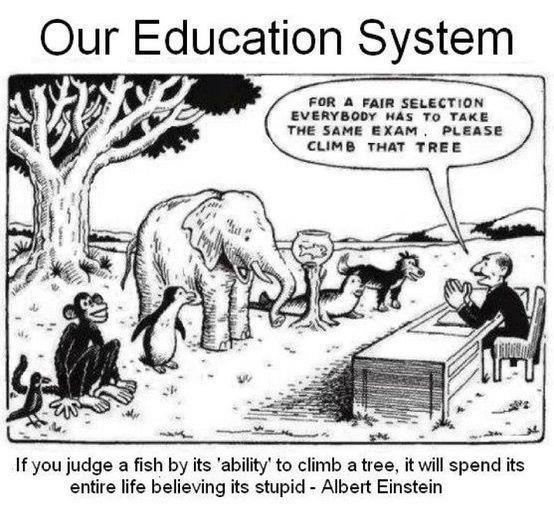"If you judge a fish by its 'ability' to climb a tree, it will spend its entire life believing it's stupid." ~ Albert Einstein
Just the other day I was telling my daughter that regardless of how she does on a standardized test or a placement test, it does not make her less smart, less talented, or mean that she won’t be successful in life if she doesn’t get a perfect score, or place in a top percentile, or qualify for a special program.
It seems that many of her friends feel pressured to score practically perfectly on tests in school. While I agree that children should strive to do academically well, a perfect performance isn’t going to guarantee them a six figure salary upon graduation, nor a permanent position until retirement with a single firm. The stress that some of these children are feeling is placed in part on their shoulders by their parents, and in part by some teachers. I don’t blame them. I just don’t agree with them. Society has said that it’s important that children take these tests, and that you should want to be the best of the best and outperform all of the rest. But I stop and ask myself – why? Bragging rights?
Some of these parents even enroll their children in extra optional math and language classes on weekends in hopes that they will score off the charts. The poor kids don’t get a break to play Barbies or run around outside with their friends, it seems. To me, play time is a form of education, social adaptation, and imagination enrichment at a young age – which is just as important as doing well in school. And everyone needs to blow off some steam – even kids!
The local school district tests kids for a program they call "Reach", which allows selected students to do special projects and additional activities outside of the regular classroom. They can learn about artists and explore topics in science that wouldn’t be covered during a normal classroom stint. It is a great program. It actually adds back to the curriculum a lot of the things that have been taken out over the years because teachers are now more focused teaching towards having kids do well on state-wide standardized tests – so they “teach to the test” and leave out the “rest”. Well, I think the “rest” is just as important.
So now, with a “regular” curriculum, as a result of everything being geared towards “the tests”, there are less field trips, less detours from required reading, less artistic activities, and the kids learn exactly what they need to learn, so hopefully a majority of the students in a school district will do well and make the schools and faculty shine. They learn no more; they learn no less; and they are missing out on other types of learning that are equally essential. Some of my most memorable times in school were when the teacher deviated from a prescribed reading list, and I got to read books that other classes weren’t reading. Taking field trips to museums, radio stations, TV studios, and nature preserves was amazing, and I learned a lot that you couldn’t read from a book or calculate in a math problem.
Sure, people want to have some point of evaluation of how well their children are being educated, but a lot more goes into that than filling in dots on a piece of paper or writing an essay. There are hundreds of colleges that agree with me, actually. Many of them have stopped using standardized tests as admission criteria. Unfortunately, “ the same cannot be said for k-12, where scores on achievement tests are in part used for everything from admitting students to prestigious public schools to placing students in gifted or remedial programs, allocating federal funding, and even evaluating teachers.” (Time Magazine, October 2012) If you need more reasons why standardized tests as a measurement of skill and intelligence is not all that it’s cracked up to be, here you go. Add in, that for some children, English is their second language, and they may be a genius in their native tongue, but due to their inability to translate the test questions perfectly, they just got dinged for being unequally bilingual.
Here’s some irony for you – I’m a writer and I love to read. I don’t have astigmatism, and I have 20/20 vision (thankfully!) but I can never truly grasp the meaning of what I read the first time around. I always have to read something 2 – 3 times before my comprehension is the same as others who “get it” the first time they read a paragraph, chapter, or book. It takes me twice as long to read a letter, email, book, or contract as your average person. It’s been this way for me since I was five and first learned how to read. Teachers thought my comprehension skills would improve over the years. It never measurably did. And I never let it ruin my love of literature. Does that make me any less knowledgeable? No. Because something takes me a little more time to accomplish, does that make me less “smart”? No. But on a standardized test if I didn’t finish a reading comprehension section in the time allotted, the score sure would make me look stupid!
Tests, do not measure the achievements or the potential of students. Some of our greatest minds in society didn’t have the greatest test scores.
So, my daughter just took a Reach placement test for students in second grade. Not everyone qualifies for the special program. We don't know how she did yet. If she gets in, we’ll be happy; and if she doesn’t, we’ll be ok with that, too. I told her that the end result really doesn't matter because so many people possess talents that they don't even test for! What if you're an excellent horseback rider? They certainly don't test for that in school! You can juggle? Well that's not evaluated. She told me most of the test was centered around logic problems. I thought to myself right away, well, that's not exactly broad. What if you are a creative writer but just stink at math? What if your strengths are in other areas? Are you any less deserving of learning outside of the (test) box?
I told my daughter that no matter what the results are, she should not feel like she doesn't have talent, and she's definitely still special. Some of the most brilliant minds and the most talented people possess skills that can't be measured on standardized tests.
What I want to say to all of the kids out there is – when you don’t get a high score on a test to place into a certain program, or to get into a certain college, or are not in the top percentile on a standardized test – realize that you are off the charts – their charts. It does not make you any less smart than anyone else. It does not mean you are not talented. It doesn’t mean that you can’t do great things with your life! Because you can! <-- THAT, is what should be taught in schools!












 RSS Feed
RSS Feed





